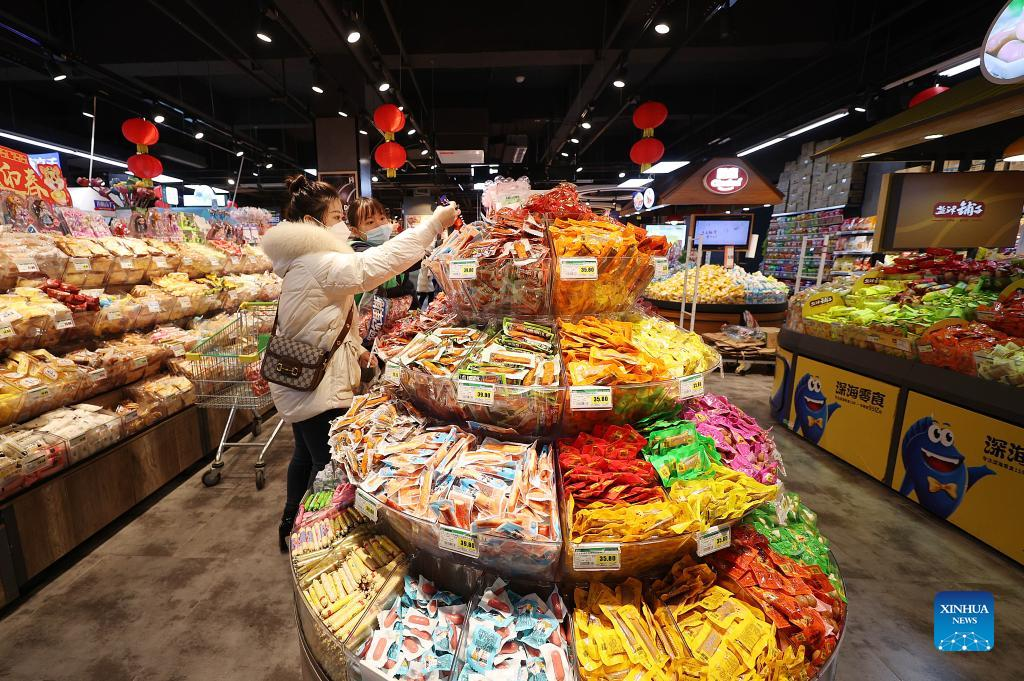
With a mild retreat last month, China's inflation largely remained tame throughout 2021 against the backdrop of sustained economic recovery, while soaring prices emerged as a massive threat in many parts of the world.

Customers select goods at a market in Danzhai County of Qiandongnan Miao and Dong Autonomous Prefecture, southwest China's Guizhou Province, Jan. 12, 2022. (Photo by Huang Xiaohai/Xinhua)
China's consumer price index (CPI), a main gauge of inflation, rose 1.5 percent year on year in December, down from the 2.3-percent increase a month ago, the National Bureau of Statistics (NBS) said Wednesday.
Inflation climbed 0.9 percent in 2021, well below the country's annual target of approximately 3 percent.
In the face of COVID-19 outbreaks in multiple places, the authorities have also coordinated measures to rein in the pandemic and ensure goods supplies, which helped stabilize prices and maintain market stability, senior NBS statistician Dong Lijuan said.
Breaking down the December inflation data, food prices dropped 1.2 percent from a year ago, reversing the 1.6-percent rise in November. The price of pork, a staple meat in China, slumped 36.7 percent, 4 percentage points greater than a month ago. The prices of other farm produce from vegetables to fish and eggs registered smaller increases.
Non-food prices, including gasoline and diesel prices, rose 2.1 percent from a year earlier, easing from the 2.5 percent in November. The core CPI, which excludes food and energy prices, gained 1.2 percent year on year in December, unchanged from a month ago.
The country's consumer prices experienced an upward trend at a low level in 2021, peaking in November at merely 2.3 percent, thanks to decisive, effective action by the government to bolster production of daily necessities and smooth sharp fluctuations of commodity prices.
In 2020 and 2019, China's inflation rose 2.5 percent and 2.9 percent, respectively.
"Despite a global liquidity flooding and international imbalance in commodity supply and demand, prices in China generally stayed within a reasonable range, in sharp contrast to the global spike," Guo Liyan, a researcher with the Chinese Academy of Macroeconomic Research, said.
"It fully shows that China's economy is resilient and the measures to ensure the supply and stabilize prices are effective."
Looking ahead, analysts expect more consumer price rises this year as the pork price has begun an upward spiral and the increase in commodity prices will start to influence consumer goods, but noting that the price gains will be reasonable.
Wednesday's data showed China's producer price index (PPI), which measures costs for goods at the factory gate, went up 10.3 percent year on year in December, narrowing from 12.9 percent in November. For the full year of 2021, the PPI rose 8.1 percent.
"China should keep the policy of ensuring the supply of bulk commodities for price stability this year," Wen Bin, chief analyst at China Minsheng Bank, said. Wen stressed measures to cope with imported inflationary pressures, stimulate domestic market potential, and ramp up support for market entities.
A balance should prevail among multiple goals of bolstering economic growth, keeping inflation under control, and fending off risks, he added.